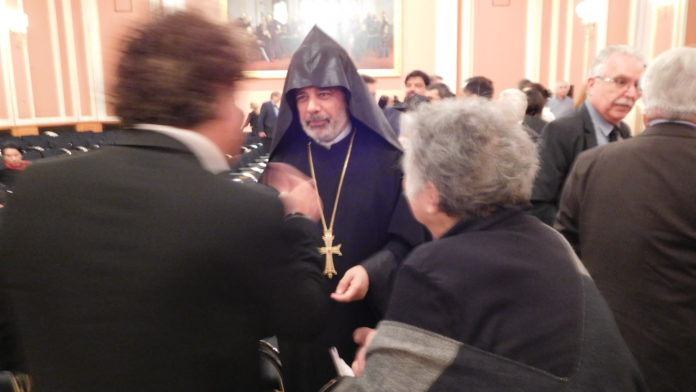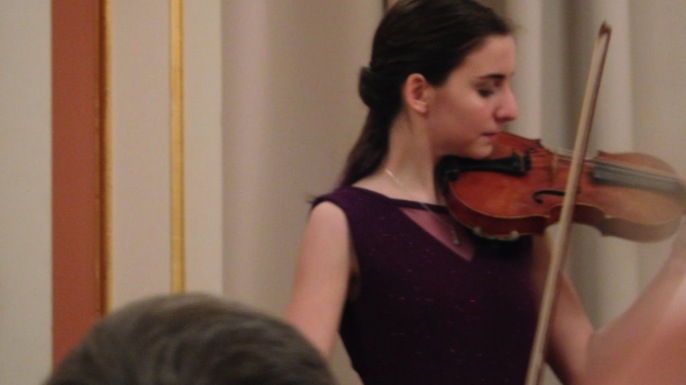Between Remembrance and Expectation
May/03/2018 Archived in:Armenian Genocide | Germany

Very Rev. Serovbe Isakhanyan, Primate of the Armenian Church in Germany
by Muriel Mirak-Weissbach
BERLIN , MAY 3, 2018— This year’s commemoration of the genocide was different in Germany. To be sure, there were speeches recalling the dark and tragic events of 1915, and there were demands for progress in implementing the measures contained in the genocide recognition resolution passed by the Bundestag (Parliament) in June 2016. There was magnificent music performed by talented young Armenians, and the ceremonies concluded with solemn prayers for the souls of the victims.
But the spirit pervading the gathering at the banquet hall of the historic Berlin Rathaus (Town Hall) on April 24 was different. Though solemn, the mood was also animated by hope, reflecting the optimism generated by the civil society movement in Armenia, which was breaking new ground in the process towards political and economic reforms. At the same time, one could almost feel a certain tension in the air, expressing uncertainty regarding the ultimate outcome of events.
Following a moving performance on the duduk of Vache Hovsepyan’s Aravot luso, played by Harutyun Chkolyan, Prof. Elke Hartmann of Bamberg University greeted the many diplomats, political figures, church representatives and Armenian community members in the name of the organizers. The organizers this year were many. Significantly, the hosts included the Armenian Embassy, the Diocese of the Armenian Church in Germany and the Central Council of the Armenians in Germany, in collaboration with the Armenian Community of Berlin as well as the Armenian Church and Cultural Community in Berlin. Such a show of unity among the various Armenian organizations was most welcome.
Expanding Genocide Research in Universities …
Prof. Elke Hartmann, who is also co-founder of the research project Houshamadyan, which reconstructs daily life and culture of Ottoman Armenians, referred to the 2016 resolution, which expresses support for Turkish-Armenian steps towards understanding and reconciliation, as well as a broad educational effort in Germany on the genocide. In this context, she formulated a proposal for genocide studies institutes to be established here.
“Working through the history of the genocide in a scientific manner is the foundation for all other initiatives, understanding and hopefully reconciliation.” Such scholarly work is required not only to provide for school text books, but also for experts whom intellectuals, artists and the broader public can look to for assistance and guidance. Germany should not only support researchers in Armenia and Turkey: “more important would be the creation of academic structures in Germany itself, for research into the genocide against the Ottoman Armenians.” Germany’s academic institutions could provide the “protected and neutral space required for such sensitive as well as emotionally charged research to unfold.” A further advantage Germany offers is a “state and a society that, conscious of its own historical co-responsibility, feels closely bound both to Armenians and Turks.” And, German scholarship and society have developed an expertise in dealing with the country’s own past.
Hartmann underscored the urgency of her proposal considering the latest developments in Turkey, where “an entire generation of critical voices is being eliminated,” some even persecuted because of their striving for reconciliation. And as for Armenia, she underlined the importance of a “critical historical consideration of the Ottoman past” for achieving stable democracy and peace. Hartmann characterized international recognition and condemnation of the genocide as providing necessary protection for the Armenian Republic. “This would be an important building block to break the spiral of existential threat, war and militarization, and to promote lasting democratic development, hopeful indications of which we have seen again just in the last few days.”
… and in Schools
Ambassador Ashot Smbatyan opened his greetings by noting that worldwide Armenians were coming together to commemorate the genocide 103 years ago, which robbed so many of their very lives. Shifting to a more positive note, he said that the developments of recent days had filled him with confidence that Armenia and the Armenian people would succeed in their desire to establish a democratic society, a statement that elicited energetic, sustained applause from the hundreds of guests.
There are no Armenians alive today, he went on, who have not been affected by the genocide, but now they are living in peace and dignity. Considering that genocides occurred not only in the past century, the ambassador stressed the importance of spreading knowledge of the past, especially among the younger generation, as a means of preventing renewed outbreaks of such crimes. Here he also took up the 2016 resolution, quoting those passages relating to the task of working through the history of the genocide, and lamented the fact that only four of Germany’s federal states — which have jurisdiction over school curricula — have thus far introduced the Armenian genocide in courses of study. In Turkey, the need for spreading knowledge is dramatic, as journalists who try to address the issue are subjected to persecution and children in schools have no chance at all to learn about the past. Achieving recognition of the genocide without such knowledge is impossible, and without recognition there can be no reconciliation.
Diana Adamyan, a young prize-winning violinist, performed Bach’s Sonata No. 1 in G Minor, III, Siciliana, with such intensity that the hundreds of attendants listened in rapt concentration.
The vice president of the Bundestag, Petra Pau, a parliamentarian from the Left Party (Die Linke), delivered a brief address. Titled, “Where Hatred Wins, Humanity Loses,” it underlined the importance of remembrance as a means to prevent recurrence of the catastrophe. She pointed to January 27, the day that the Bundestag commemorates the Holocaust, and lamented the fact that since a right-wing party now has parliamentary representatives, this act of remembrance has been cast into doubt. The right-wing Alternative for Germany has in fact called for a 180-degree shift in the culture of remembrance, has dubbed a holocaust memorial a “disgrace” and has urged appreciation of the achievements of the Wehrmacht. Pau said she considers such demands tantamount to derision of the victims, not only of the Holocaust but also of the Armenian Genocide. The Bundestag resolution of 2016 acknowledged the genocide as well as the German role, but Turkey has yet to do so. Voicing confidence that Turkey would have to recognize it, “sooner or later,” for the sake of the future, she recalled that Germany also required decades before it could come to terms with the Holocaust. Only 40 years later, she said, did a German president designate May 8, when the Nazi regime was defeated, as a “day of liberation.”
Quoting President Richard von Weizsäcker, in his plea for shunning hatred and learning “to live with one another, not against each other,” she stressed its relevance to the present. “Where hatred and violence are victorious,” she said, “democracy and humanity lose — then as now.”

Diana Adamyan
A Lesson in the History of the Genocide
Harutyun Chkolyan performed Vardani mor voghb, a medieval dirge on the duduk, which served as a musical transition to the commemorative speech delivered by Prof. Jörn Leonhard, director of the Chair for Modern and Contemporary European History at the Freiburg University. Leonhard offered an in-depth presentation of the genocide, based on contemporary eyewitness reports and official documents — as if in response to the calls by previous speakers for more thorough education on the subject. He showed how the genocide, a carefully pre-planned operation, put an end to “the late 19th-century idea of Ottomanism, to integrate the different religions of the multiethnic Ottoman Empire.”
Although following the Balkan wars, the German and Russian empires sought to impose reforms, granting autonomy rights in two Armenian provinces, “for Young Turk elite, which had taken power in 1908, this would have placed the territorial integrity of the Ottoman Empire further in question,” Leonhard said.
Ottoman policy shifted towards the vision of a Turkified social order. With the war came the systematic dispossession and murder of Greeks and Armenians, as the Young Turks pursued their drive for ethnic homogeneity. Exploiting rumors of Armenian collaboration with the Russians, the regime ordered Armenian soldiers to be “disarmed, forced initially into labor battalions and then between April 1915 and September 1916 systematically killed.” Although “local contexts and subjective perceptions encouraged a cumulative radicalization of violence, what was decisive was that in this concrete situation a preexisting strategy of the Young Turks was being implemented.”
Leonhard detailed, month by month, how the massacres spread, from Mush to Van, and beyond. In June 1915 the German ambassador Hans Freiherr von Wangenheim reported that the deportations underway were being carried out “not only motivated by military setbacks,” but, as Interior Minister Talaat had openly admitted, to eliminate all “domestic enemies.” By June in fact, the plan was no longer secret, as Talaat called for ethnic cleansing and the large-scale death marches to the Syrian desert proceeded. Leonhard made clear that both the Americans and the Germans knew what was occurring, but did not intervene; he cited the work done by Armin Wegner in documenting the genocide through photographs as well as the Foreign Ministry documents published by Johannes Lepsius. The significance of the genocide, Leonhard said, lay not only in the “quantity of the war victims … the millions of dead soldiers and civilians … [but] the fundamentally new quality of violence … a new dimension of violence against the civilian population.” And this called for new juridical approaches. He related how Raphael Lemkin, having learned about the trial of Talaat’s assassin Soghomon Tehlirian, oriented his studies in law to address the question of genocide, and succeeded in drafting the UN resolution passed in 1948.
If legal means to punish genocide are necessary, Leonhard continued, so is a culture of remembrance. The wounds of the genocide are still open. In Germany, attention has been focused on the Holocaust in World War II with the result that the genocide during the previous war, and Germany’s role in it, have not been adequately dealt with. Again, what comes to the fore is the need for study, research and dissemination of knowledge about the Armenian genocide.
Violinist Diana Adamyan provided musical reflection with a moving rendition of Krunk by Komitas, after which the clergymen mounted the stage. Very Rev. Serovbe Isakhanyan, Primate of the Armenian Church in Germany, who was joined at the event by Coptic and Aramaen religious leaders, offered the intercessory prayers.
Late night news broadcasts indicated that the political process in Armenia was moving forward, fraught with tension and uncertainty, but without violence. Those gathered in the Rathaus had commemorated the victims of the past with respect and dignity, uplifted by a sense of cautious faith in the future.

